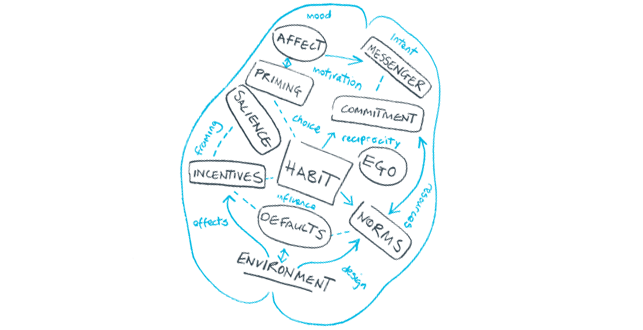SHOULD POLICY MAKERS USE A CHECKLIST when designing public policies? The authors of MINDSPACE think they should.
SHOULD POLICY MAKERS USE A CHECKLIST when designing public policies? The authors of MINDSPACE think they should.
MINDSPACE is a document initiated by the United Kingdom Cabinet Office, the Institute for Government and five academics (Paul Dolan, Michael Hallsworth, David Halpern, Dominic King, Ivo Vlaev). I came across the March 2010 report in my Behaviour, Happiness and Public Policy course this past term (of which Paul Dolan is the professor).
The motivation for the report is the growing awareness of the applicability of behavioural economics to public policy making. Our understanding of human behaviour has greatly improved over the last decade or so, and the Cabinet Office and Institute for Government speculated some of these recent discoveries could be used to positively influence policymaking. Their application of this speculation is presented via the MINDSPACE report.
The authors recognize at the outset of the report that the aim of most government policies is to influence human behaviour. Many of us will be familiar with ‘command-and-control’ approaches such as regulation, legislation and taxes. But many current challenges—for example, obesity, sustainable lifestyles, voting and preventing crime—are better approached in different ways: the report states that we need to focus on how to ‘nudge’ people to change their habits, most importantly in a way that requires little effort for them.
The resulting document aims to aid policy makers in integrating behavioural approaches to their policy making. It does so through the creation of the mnemonic known as MINDSPACE. It seeks to influence and suggest actions for tackling some of government’s most challenging policy decisions such as reducing crime, dealing with obesity and creating an environmentally sustainable society.
So, what does MINDSPACE stand for?
| Messenger | We are heavily influenced by who communicates information |
| Incentives | Our responses to incentives are shaped by predictable mental shortcuts such as strongly avoiding losses |
| Norms | We are strongly influenced by what others do |
| Defaults | We ‘go with the flow’ of pre-set options |
| Salience | Our attention is drawn to what is novel and seems relevant to us |
| Priming | Our acts are often influenced by sub-conscious cues |
| Affect | Our emotional associations can powerfully shape our actions |
| Commitments | We seek to be consistent with our public promises, and reciprocate acts |
| Ego | We act in ways that make us feel better about ourselves |
(Adapted from the MINDSPACE report)
While all of these insights are fascinating, the power of norms stands out as most relevant to an environmental context. If people are strongly influenced by what others are doing, then making people aware of their neighbours’ environmental behaviours—sorting their recycling, donating old clothing, conserving electricity—should lead to increases in these behaviours.
A US-based company, OPower, is tapping into the influence of norms by informing customers where they rank on their electricity consumption with respect to other households like theirs in the same city. The MINDSPACE report stresses that the more personally relevant you can make the norm, the more influence it will have on behaviour. So for comparing electricity consumption, it would be less effective to compare households in differing states and cities, and more effective to compare similar households on the same street.
However, those interested in nudging behaviour must tread lightly here, because there is a risk of a ‘boomerang effect’ when informing people of norms, depending on where they rank in relation to the positive behaviour. For instance, in the electricity consumption example, it was found that telling people they consumed less energy than average actually caused them to increase their usage. Because of this finding, OPower now uses a smiley face, rather than telling people “you consume less than others”.
Commitments and ego are also particularly important factors for policy makers seeking to influence environmental behaviours. If we commit publicly to something, we are more likely to feel pressure to follow through with it. So imagine if you posted your energy conservation goals or recycling habits on social media – would this hold you accountable to following through with those goals? In theory, yes. It would probably be even stronger if you made certain commitments in front of a dinner table of your close friends, or wrote down your commitments and showed them to someone else.
Ego plays off of our public commitments. If we see ourselves as ‘self-committed’, then we will try our best to match our commitments with our behaviours. If our public commitments are validated, this pats our ego on the back.
The MINDSPACE report discusses some policy interventions that fit with the report’s hypothesis. I especially enjoy the idea of ‘Reverse Vending Machines’ (RVM’s): these are devices that “accept empty beverage containers and can return money to the user”. Because a lot of littering or misplacing of bottles comes from “on-the-go purchases”, RMV’s could help solve this problem if placed in “on-the-go locations,” or next to trashcans. And for the environmentally committed (or short on cash), perhaps it would even encourage people to pick up litter around the area. This type of solution plays directly to people’s preferences towards incentives, one of the key findings in the report.
Overall, the MINDSPACE report provides valuable insights for public policy making—and I think the ease of the mnemonic as a checklist will be useful for busy policy makers.
I hereby publically commit to printing out a copy of the checklist and placing it on my wall when I land my first policy job. Will you hold me accountable?
Tweet your own energy conservation or other environmental goals to @AlternativesJ!
The Policy Probe blog features posts from Julia Hawthornthwaite about environmental policy and European perspectives on environmental issues on the first Wednesday of each month, plus guest posts in between.
Julia is a graduate from the University of Waterloo’s Environment and Resource Studies program, and is currently pursuing a Master’s of Environmental Policy and Regulation at the London School of Economics in London, England.













